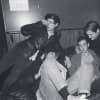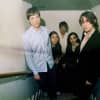Listening to Iceage’s music can be a very cathartic experience, but interviewing the Copenhagen four-piece is stressful. Almost notoriously so. When I showed up at the Matador offices in New York late last month to talk to them about their explosive new LP, You’re Nothing, which drops today, they were sitting with their tour manager Logan Worrell in a meeting room scattered with the remnants of a cheeseburger feast, wincing their way through a day of press that had already brought the precipitous departure of another interviewer. Their publicist warned me that they wouldn’t respond well to biographical questions they’d been asked before, so I’d typed out a list of talking points focusing mainly on the album itself—specifically, how it seems more structurally gymnastic and emotionally confessional than its predecessor, New Brigade.
Iceage were by no means uncooperative, but my approach didn’t really work. Frontman Elias Bender Rønnenfelt picked at my questions like olives in a dish, drummer Dan Kjær Nielsen and bassist Jakob Tvilling Pless kept quiet for the most part and guitarist Johan Surrballe Wieth made a relatively heroic attempt to fill in the missing pieces, of which there were many. I couldn't tell if the questions I had prepared were too obvious for Iceage, or if they were too abstract; I sweated, and wondered whether Iceage's reticence could be explained by something as endearing as youthful shyness, or if it was more the product of laziness, hangovers, an attempt to cultivate mystique, or a even a slightly twisted (though perhaps ideologically motivated) pleasure in frustrating a journalist's attempts to get them to open up. Maybe it was a combination of them all, but really, the hardest part about interviewing a band as tight-lipped as Iceage is imagining what they're probably thinking about you, which is that you probably wouldn’t be interviewing them in the first place if you truly understood their conviction that their music speaks for itself, and that you should probably just go home and listen to the record.
Do you guys feel like you’ve gotten better at interviews since you started out, or more comfortable? RØNNENFELT: Uh, it very much depends. WIETH: In a way. Maybe. It’s been bad though.
What’s an example of a really bad interview you’d done? WORRELL: The one we just did is up there. We just told the guy if you didn’t have any intelligent questions to ask you should probably stop doing this interview. And the guy was like, I fully agree.
Now I feel scared. WORRELL: There’s a bunch of them where I swear, [the band was] only talking in one word syllables, or [questions] that are just like, No. Yes, No. Dude was like making me cry.
So I was wondering about the new album, which is really good... Are the songs on it ones that you’ve had around for a while, or that you wrote more recently? WIETH: It’s started right after New Brigade was finished and was coming out. RØNNENFELT: We started writing newer songs for the album that hadn’t even come out yet. We never really stopped.
Does this group of songs feel structurally different to you from the ones on New Brigade? RØNNENFELT: From the album? Structurally, it’s kind of the same because… WIETH: I don’t think we have one certain structure, I guess. Once we showed after New Brigade, [those songs] were definitely different from when they were first initially made. They changed a lot over that period of time I think.
How do they feel different? WIETH: It’s hard to say. It’s hard to explain when you’re in it. It’s natural. It keeps changing, so you don’t really notice. But there is a difference. RØNNENFELT: Yeah, some of [the new songs have] a heavier guitar sound, and some of it feels a bit emotionally heavier also. WIETH: I think it’s more dense in a way.
I definitely feel that. It’s hard even for me to describe what your music sounds like. There’s so much going on, and so fast. RØNNENFELT: Yeah, but the thing is, we never talk about in words what we want things to sound like, so we don’t really know how to describe it either.
So do you just start improvising together? MULTIPLE BAND MEMBERS: No. RØNNENFELT: We come up with a sketch for a song, and then we [teach] each other the things, and each of us finds his own way to do it, or we talk about how we could do it better.
And do the lyrical themes usually come first or after? RØNNENFELT: Mostly they come…WIETH: After. RØNNENFELT: No, separate, and then you find some stuff and try to fit in and match it against the riff.
Do you write it down in a book or something? RØNNENFELT: Yeah, and then like if you’ve written something and it kind of fits, and if it doesn’t fit exactly you’ll…
Choose a new word? RØNNENFELT: Yeah. But of course what kind of song it is also kind of decides what kind of word you can put in or not.
How did your experience of recording the album differ from the last one? WIETH: The same, but I think more intense, because we were on an island. You couldn’t leave, it was a very secluded area. It probably gave more focus to the process. It was very nice. RØNNENFELT: Yeah, the first time around we recorded in Copenhagen from like ten to five each day and we would go after and do other shit and somebody would go and come too late because they were hung over, but there we were like, trapped there together. We had nothing to do there but work at the album.
Would you say that musically there are things you have started thinking about more this time around? WIETH: I think with the first one, there was still some stuff where we were like, Aw, you can’t do that. I think we just thought broader this time.
So there were fewer rules. WIETH: Fewer rules, yeah. Not that there were that many rules...
You’ve said that this album was more introspective than the last— or more raw emotionally. What have you experienced recently that would make you turn inward in that way? RØNNENFELT: Like personal experiences. Like personal stuff really, [that I don’t think I want to discuss.] I guess we got more into writing and more conscious of it. WIETH: I think it’s you’re more aware of what your feeling. It’s not so much that you have to describe everything else. You know yourself more probably because time went by.
Do you mean you’re getting older? WIETH: I dunno. Yeah, in a way. And in another way just growing younger I guess.
Do you feel like you’ve grown a lot as people in one year? RØNNENFELT: Yeah, sure. WIETH: Maybe. I think people grow quite constantly I guess.
You’ve certainly lived through a lot. RØNNENFELT: Yeah, it’s kind of like, the last few years, I don’t try to think about it much, because I don’t think I’ll be able to wrap my head around it.
Elias, when you spoke with Jenn Pelly recently... [Rønnenfelt picks up a call to his cell, starts talking to somebody in Danish, hangs up.] RØNNENFELT: You mean the recent Pitchfork thing?
Yes. You talked about how Iceage should not only cover emotions that come with a clenched fist. Do you remember that? RØNNENFELT: Yeah. What I meant by that is we’re not like the kind of punk band where everything has to be like ughhhh [fist pumps]. We also try to… VARIOUS BAND MEMBERS: Huhhh. Uhhhhrr. RØNNENFELT: We try to cover a wide range of emotions, I guess. Not that the one [LP] is more varied than the other.
So you’re not privileging anger? WIETH: All emotions can be really intense.
Which ones do you hear coming through a lot on the album? RØNNENFELT: I think I’m gonna sound stupid if I try to answer that question so... Yeah, I don’t know.
A lot of the lyrics seem to revolve around feeling blocked or trapped by something and trying to break out of it... RØNNENFELT: Yeah I kind write about that, in some places.
And the sound of the music feels appropriate to that kind of emotion to me because it’s very simple but it’s always tumbling over itself. It feels like it’s trying to break out of itself. The structures themselves feel like very malleable. WIETH: If it makes sense to you, I guess it makes sense.
Can we talk a little bit about Copenhagen and how the scene has or hasn’t changed since you guys started getting more attention? WIETH: It hasn’t really changed. Well, it’s changed because people started doing different, new kinds of music. It hasn’t changed but of course the attention—the international attention—we’re aware of it. In a bad and a good way I guess, but nothing’s really changed amongst people. It’s maybe become a bit bigger, I guess. RØNNENFELT: Yeah, more people get involved, and the level of attention has kind of risen, but how everything works with how people work with each other is the same. And people are gradually getting better at what they’re doing.
In America, once a certain artist starts getting attention in a certain scene, often more and more talents start popping up around them. RØNNENFELT: I don’t think that’s the case here. From the start people don’t start doing things to get attention.
Well, I just meant they are inspired by somebody achieving something. RØNNENFELT: I don’t think that’s the motivation for many people. WIETH: Yeah, that’s in a way a bad motivation—like do this, and then some blog will write cool things about you. That’s not a great motivation. You should just do it because it motivates you, and you’re doing something you like, for yourself.
But It feels good to connect with people, right? WIETH: Yeah, it does. RØNNENFELT: Yeah, of course. If you’re meeting someone, and you kinda feel like they get what you’re doing, it’s like, Ok, that message came through. Good. And if you meet people who are like, Great show, and then they say a bunch of shit you can’t recognize, then you’re… oh.
A bunch of shit you can’t recognize? RØNNENFELT: I don’t know.
Do you guys read press about yourself? RØNNENFELT: Occasionally. WIETH: Like reviews and stuff? Every now and then, yeah.
So you’re not like against the idea of reading it? WIETH: No, it’s fine. It doesn’t make a difference. It can be interesting. RØNNENFELT: It doesn’t really have any affect on what we do, but sometimes you’re like, Oh, that’s fucked up, and sometimes you’re like, Oh, thanks. WIETH: But I don’t think I pay too much attention. Like I don’t get upset.
What would feel like a compliment to hear someone say? WIETH: That we’re a really good band and it sounded great and wohoo. There was a guy in Bristol. He’s a really big music lover. He goes to shows everyday, and I think he told us we had a Crass-like energy, and we don’t sound like Crass, but I guess that was quite a compliment. RØNNENFELT: I don’t know, because i don’t really see this band at all... VARIOUS BAND MEMBERS: Nah.... WIETH: Just like if you can actually see that someone is serious and mean what they say, it’s nice.
Where do you think you guys will go next, musically speaking? RØNNENFELT: It’s hard to pinpoint the direction but it’s... WIETH: Different.
How so? RØNNENFELT: It just feels like we’re watching the band grow further. Like if the first record is like a flower like that [shows with his hands], the next one opens a little bit more, and the next one is going to be like this [hands have opened to suggest a flower in full bloom].
Like a full actualization? RØNNENFELT: Something like that.



